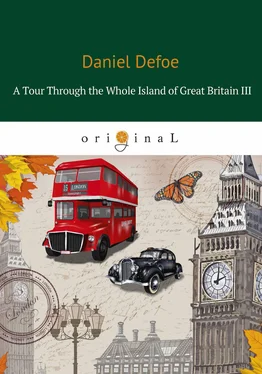From hence leaving Nottinghamshire, the west part abounding with lead and coal, I cross’d over that fury of a river called the Derwent, and came to Derby, the capital of the county.
This is a fine, beautiful, and pleasant town; it has more families of gentlemen in it than is usual in towns so remote, and therefore here is a great deal of good and some gay company: Perhaps the rather, because the Peak being so near, and taking up the larger part of the county, and being so inhospitable, so rugged and so wild a place, the gentry choose to reside at Derby, rather than upon their estates, as they do in other places.
It must be allowed, that the twelve miles between Nottingham and this town, keeping the mid-way between the Trent on the left, and the mountains on the right, are as agreeable with respect to the situation, the soil, and the well planting of the country, as any spot of ground, at least that I have seen of that length, in England.
The town of Derby is situated on the west bank of the Derwent, over which it has a very fine bridge, well built, but antient, and a chapel upon the bridge, now converted into a dwelling-house. Here is a curiosity in trade worth observing, as being the only one of its kind in England, namely, a throwing or throwster’s mill, which performs by a wheel turn’d by the water; and though it cannot perform the doubling part of a throwster’s work, which can only be done by a handwheel, yet it turns the other work, and performs the labour of many hands. Whether it answers the expence or not, that is not my business.
This work was erected by one Soracule, a man expert in making mill-work, especially for raising water to supply towns for family use: But he made a very odd experiment at this place; for going to show some gentlemen the curiosity, as he called it, of his mili, and crossing the planks which lay just above the millwheel; regarding, it seems, what he was to show his friends more than the place where he was, and too eager in describing things, keeping his eye rather upon what he pointed at with his fingers than what he stept upon with his feet, he stepp’d awry and slipt into the river.
He was so very close to the sluice which let the water out upon the wheel, and which was then pulled up, that tho’ help was just at hand, there was no taking hold of him, till by the force of the water he was carried through, and pushed just under the large wheel, which was then going round at a great rate. The body being thus forc’d in between two of the plashers of the wheel, stopt the motion for a little while, till the water pushing hard to force its way, the plasher beyond him gave way and broke; upon which the wheel went again, and, like Jonah’s whale, spewed him out, not upon dry land, but into that part they call the apron, and so to the mill-tail, where he was taken up, and received no hurt at all.
Derby, as I have said, is a town of gentry, rather than trade; yet it is populous, well built, has five parishes, a large marketplace, a fine town-house, and very handsome streets.
In the church of Allhallows, or, as the Spaniards call it, De Todos los Santos , All Saints, is the Pantheon, or Burial-place of the noble, now ducal family of Cavendish, now Devonshire, which was first erected by the Countess of Shrewsbury, who not only built the vault or sepulchre, but an hospital for eight poor men and four women, close by the church, and settled their maintenance, which is continued to this day: Here are very magnificent monuments for the family of Cavendish; and at this church is a famous tower or steeple, which for the heighth and beauty of its building, is not equalled in this county, or in any of those adjacent.
By an inscription upon this church, it was erected, or at least the steeple, at the charge of the maids and batchelors of the town; on which account, whenever a maid, native of the town, was marry’d, the bells were rung by batchelors: How long the custom lasted, we do not read; but I do not find that it is continued, at least not strictly.
The government of this town, for it is a corporation, and sends two burgesses to Parliament, is in a mayor, high-steward, nine aldermen, a recorder, fourteen brothers, fourteen capital burgesses, and a town-clerk: The trade of the town is chiefly in good malt and good ale; nor is the quantity of the latter unreasonably small, which, as they say, they dispose of among themselves, though they spare some to their neighbours too.
The Peak District
It is observable, that as the Trent makes the frontier or bounds of the county of Derby south, so the Dove and the Erwash make the bounds east and west, and the Derwent runs through the center; all of them beginning and ending their course in the same county; for they rise in the Peak, and end in the Trent.
I that had read Cotton’s Wonders of the Peak , in which I always wondered more at the poetry than at the Peak; and in which there was much good humour, tho’ but little good verse, could not satisfy my self to be in Derbyshire, and not see the River Dove, which that gentleman has spent so much doggerel upon, and celebrated to such a degree for trout and grailing: So from Derby we went to Dove-Bridge, or, as the country people call it, Dowbridge, where we had the pleasure to see the river drowning the low-grounds by a sudden shower, and hastning to the Trent with a most outrageous stream, in which there being no great diversion, and travelling being not very safe in a rainy season on that side, we omitted seeing Ashbourn and Uttoxeter, the Utocetum of the antients, two market towns upon that river, and returning towards Derby, we went from thence directly up into the High Peak.
In our way we past an antient seat, large, but not very gay, of Sir Nathaniel Curson, a noted and (for wealth) over great family, for many ages inhabitants of this county. Hence we kept the Derwent on our right-hand, but kept our distance, the waters being out; for the Derwent is a frightful creature when the hills load her current with water; I say, we kept our distance, and contented our selves with hearing the roaring of its waters, till we came to Quarn or Quarden. a little ragged, but noted village, where there is a famous chalybeat spring, to which abundance of people go in the season to drink the water, as also a cold bath. There are also several other mineral waters in this part of the country, as another chalybeat near Quarden or Quarn, a hot bath at Matlock, and another at Buxton, of which in its place; besides these, there are hot springs in several places which run waste into the ditches and brooks, and are taken no notice of, being remote among the mountains, and out of the way of the common resort.
We found the wells, as custom bids us call them, pretty full of company, the waters good, and very physical, but wretched lodging and entertainment; so I resolved to stay till I came to the south, and make shift with Tunbridge or Epsom, of which I have spoken at large in the counties of Surrey and Kent.
From Quarden we advanc’d due north, and, mounting the hills gradually for four or five miles, we soon had a most frightful view indeed among the black mountains of the Peak; however, as they were yet at a distance, and a good town lay on our left called Wirksworth, we turned thither for refreshment; Here indeed we found a specimen of what I had heard before, (viz.) that however rugged the hills were, the vales were every where fruitful, well inhabited, the markets well supplied, and the provisions extraordinary good; not forgetting the ale, which every where exceeded, if possible, what was pass’d, as if the farther north the better the liquor, and that the nearer we approach’d to Yorkshire, as the place for the best, so the ale advanc’d the nearer to its perfection.
Wirksworth is a large well-frequented market town, and market towns being very thin placed in this part of the county, they have the better trade, the people generally coming twelve or fifteen miles to a market, and sometimes much more; though there is no very great trade to this town but what relates to the lead works, and to the subterranean wretches, who they call Peakrills, who work in the mines, and who live all round this town every way.
Читать дальше












